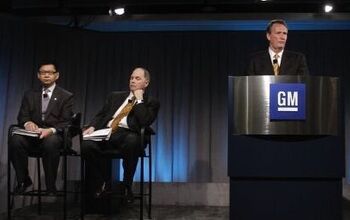GM's Transparency Pledge On The Fritz Edition
Former GM CEO Fritz Henderson may well have been a convenient punching boy in the aftermath of the Obama Administration’s firing of his predecessor, but at least the guy had a sense of obligation. Henderson was a consummate GM insider, but unlike Rick Wagoner, he realized that this status was as much a liability as an asset in the politically-fraught aftermath of the bailout. Nowhere is this more clear than in Fritz’s major contribution to GM’s public relations: in hopes of proving GM’s appreciation of its extraordinary rescue, Henderson committed GM to “open communication” and “transparency,” telling the US Senatewith the very first words of his testimony that
It’s our obligation to be open and transparent in all we do to reinvent GM, particularly with the American taxpayer as our largest investor.
Of course, The General didn’t always make good on that pledge, but at least Fritz made the effort to say he cared. Now, GM is taking the opposite approach, threatening to liberate the benighted public from the burden of its transparency. After all, the US taxpayer is no longer the majority shareholder in GM… even if, at 33%, we are still GM’s single-largest “investor.”
Automotive News [sub] reports
General Motors has settled on a strategy to quell industry chatter about a jump in its incentive spending: Disclose less.
GM sales chief Don Johnson said today that the automaker will be less forthcoming about its spiffs on a month-to-month basis. From now on, GM will talk about incentives and average transaction prices “directionally” but won’t discuss specifics.
This comes as Edmunds.com reports that GM’s average incentive per vehicle grew 29 percent in January to $3,762, the highest among large automakers. Johnson acknowledged a “modest” increase but wouldn’t talk numbers.
“There’s been a lot of noise out there in the system about sources of data, competitors saying this or that,” Johnson told analysts and reporters on a conference call. “We’re just trying to take the noise out of the system.”
Or, it will increase the “noise” in the system, as industry-watchers speculate about GM’s actual incentive spend. Remember, nothing stops speculation like the truth… and only GM can provide the real truth about its incentives.
And this is not just a question of practical PR strategy or even an obligation to taxpayers… it’s about the competition. Just as GM announced that it would be less transparent going forward, Hyundai was stepping up and providing an unprecedented amount of information with its latest sales release, including a full sales-weighted CAFE number, and the brand’s fleet mix. If Hyundai continues to provide more information while GM restricts access to its data, who do you think is going to come out looking better? Remember, they do still call this the “information age.”
AN [sub] provides another way of looking at the situation:
Christopher Ceraso, a Credit Suisse analyst, might have summed it up best. He told GM officials that less transparency could be seen as a signal that GM is getting more aggressive on price and doesn’t want to set off alarm bells.
“Generally,” he said, “less disclosure is bad.”
UPDATE: The DetN’s David Shepardson points out that GM did give us some warning about this.
More by Edward Niedermeyer
Latest Car Reviews
Read moreLatest Product Reviews
Read moreRecent Comments
- MaintenanceCosts I wish more vehicles in our market would be at or under 70" wide. Narrowness makes everything easier in the city.
- El scotto They should be supping with a very, very long spoon.
- El scotto [list=1][*]Please make an EV that's not butt-ugly. Not Jaguar gorgeous but Buick handsome will do.[/*][*] For all the golf cart dudes: A Tesla S in Plaid mode will be the fastest ride you'll ever take.[/*][*]We have actual EV owners posting on here. Just calmly stated facts and real world experience. This always seems to bring out those who would argue math.[/*][/list=1]For some people an EV will never do, too far out in the country, taking trips where an EV will need recharged, etc. If you own a home and can charge overnight an EV makes perfect sense. You're refueling while you're sleeping.My condo association is allowing owners to install chargers. You have to pay all of the owners of the parking spaces the new electric service will cross. Suggested fee is 100$ and the one getting a charger pays all the legal and filing fees. I held out for a bottle of 30 year old single malt.Perhaps high end apartments will feature reserved parking spaces with chargers in the future. Until then non home owners are relying on public charge and one of my neighbors is in IT and he charges at work. It's call a perk.I don't see company owned delivery vehicles that are EV's. The USPS and the smiley boxes should be the 1st to do this. Nor are any of our mega car dealerships doing this and but of course advertising this fact.I think a great many of the EV haters haven't came to the self-actualization that no one really cares what you drive. I can respect and appreciate what you drive but if I was pushed to answer, no I really don't care what you drive. Before everyone goes into umbrage over my last sentence, I still like cars. Especially yours.I have heated tiles in my bathroom and my kitchen. The two places you're most likely to be barefoot. An EV may fall into to the one less thing to mess with for many people.Macallan for those who were wondering.
- EBFlex The way things look in the next 5-10 years no. There are no breakthroughs in battery technology coming, the charging infrastructure is essentially nonexistent, and the price of entry is still way too high.As soon as an EV can meet the bar set by ICE in range, refueling times, and price it will take off.
- Jalop1991 Way to bury the lead. "Toyota to offer two EVs in the states"!


































Comments
Join the conversation
Surely GM mgmt doesn't actually regard their stated MSRP as the true value of their cars anymore than Ronco thinks their TeeVee vegetable peeler has an actual value of $29.99 In private, they know what the avg transaction price is of all their cars. Strange how so many car enthusiasts earnestly talk in terms of incentives off of MSRP as if that MSRP is some kind of pure and realistic number. Yet we all laugh at such puffery from any other maker/seller of mass produced goods that are built mostly by robots on a JIT assembly line. All those other products sell at 'no haggle' prices at any given retailer and can easily be checked with a quick web search. Some consumers choose to pay more in exchange for time or location convenience but you can know the real lowest price with little effort.
GM not talking about incentives really doesn't matter in the giant scheme - other than from a credibility perspective maybe. The numbers (estimates) are out there anyway. This past fall, I was in a meeting with representatives from PR, IR and accounting of one of the US-based automakers (that shall remain nameless). Speaking to the senior sales analyst (the person on the monthly sales conference call), I asked how they aggregated their incentive data. The response was that they prefer to talk about incentives "directionally" as too much detail creates the expectation of disclosure every month and that can be bad in slow selling periods. BUT - when this person does disclose incentives publicly, they would be citing a third-party data source. So this automaker doesn't even generate its own incentive data. They buy (or are given) it - like everyone else. Basically, the automakers don't have any better data than what is published by various sources every month. I found that very surprising. I guess they figure why create the salary expense for a few extra analysts to crunch transaction data every month when there are multiple sources already doing it (and fairly accurately).